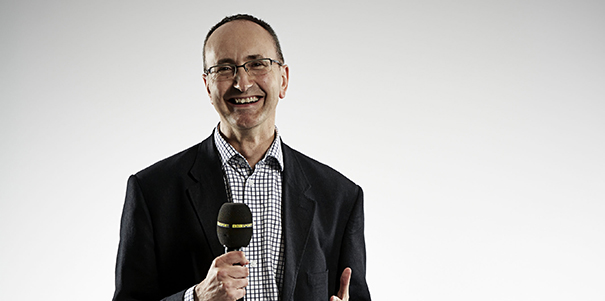Each Friday, Points North gives a senior media figure a platform to air their views on a topical or relevant issue.
This week it’s John Murray, BBC Radio 5 live’s football correspondent. He writes about the art of football commentary as he prepares to listen to some of the next generation.
As a sports commentator every now and then something comes along which prompts me to have a think about how and why it is that I do what I do.
This time it is the BBC Radio 5 live’s Young Commentator of the Year competition which is just being launched and of which I am going to be one of the judges.
It is open to children aged between 11 and 15, and so it takes me back to the time when I first was taken to a live football match. It was 1979, it was a school bus trip (from the ‘Prolific North’, as it happens) to Wembley to see England 0 Wales 0 in one of the – now defunct – Home Internationals. It was a dreadful game. But for me it was absolute magic. I am now pushing fifty but despite the fact I now travel far and wide covering football, that boring goalless draw remains one of my favourite memories.
Of course that is not because of the match it was, but because of the experience it was. I remember the first sight of the Twin Towers, what it was like on Wembley Way, what it was like queuing up the crumbling concrete steps to squeeze through the antiquated turnstiles. I remember me and my schoolmates buying England flags (and almost putting my eye out with it on the bus home), I remember the dark, dank concourse smelling of greasy beefburgers. But most of all I remember walking into the stadium bowl to see Wembley in all its glory – a wow factor that totally bowled me over and has stayed with me til this day.
I recall all this because when I do a radio football commentary, as well as the basics i.e. what’s happening in the match, the score, the players, all the relevant information; what I try to do is to give the listener an idea of the match experience. That is to say, what’s it like there, what’s the atmosphere like, what was happening outside the ground, what’s happening in the stands around us. And then almost certainly I will have a player or a manager sitting alongside me as my ‘expert summariser’ which opens up a whole different range of possibilities in terms of what to talk about.
Points North: Sara Schwartz, Account Director at Havas PR New YorkAll of the above ingredients and many more go in to creating an entertaining radio commentary. It is an art. One of my outspoken colleagues (who’s not a commentator) disputes that. I vehemently disagree. It is a constant and enduring challenge. It is impossible to do the perfect commentary. There is always something you will have overlooked. There is always something you will have missed. There is always a goal or a free kick you think you could have described better.
But when you hear someone doing it well, and it makes the hairs stand up on the back of your neck, or they use a turn of phrase that makes you smile, or you hear a description that brings it alive for you, then that is commentary as an art form.
Radio commentary now has competition from social media and ‘live text’, the attraction of which baffles me. That is the modern equivalent of watching a match on Ceefax. Why, I feel, would you prefer that to listening to the live emotion of a human voice?
So therefore I welcome this new 5 live competition and the opportunity it will give to young, budding commentators to have a first go and see if, perhaps, something clicks for them as it did for me all those years ago.
BBC Radio 5 live’s Young Commentator of the Year competition opens on Friday 22nd April and entries close on Saturday 7th May. For full details visit bbc.co.uk/youngcommentator









